Guild Wars 2: Production, experience
Before you choose both profession, consider which ones are useful for you. The list below presents usefulness of particular professions for the classes:
Your class | Very useful | Useful | Not that useful |
Elementalist | artificer, tailor, jeweler | chief | leatherworker, weaponsmith, armorsmith |
Hunter | leatherworker, huntsman, jeweler | chief, armorsmith | artificer, tailor, weaponsmith |
Fighter | weaponsmith, armorsmith, jeweler | chief, huntsman | artificer, tailor, leatherworker |
Necromancer | artificer, tailor, jeweler | chief, huntsman, armorsmith | leatherworker, weaponsmith |
Guardian | artificer, weaponsmith, armorsmith, jeweler | chief | tailor, leatherworker, huntsman |
Thief | leatherworker, armorsmith, jeweler | chief, huntsman | artificer, tailor, weaponsmith |
Engineer | leatherworker, huntsman, jeweler | chief
| artificer, tailor, weaponsmith, armorsmith |
Mesmer | artificer, tailor, jeweler | chief, huntsman, armorsmith | leatherworker, weaponsmith |
Legend:
- Very useful - most of crafted items will be in use
- Useful - you get useful items, but not much enough
- Not that useful - this profession gives you only few useful items, like boxes or sacks
The chart above shows that it's best to choose one profession crafting weapons or armors and the additional one like jeweler or chief. Choosing two profession related to crafting armors/weapons you may meet a lack of resources.
After finishing consideration, you have to craft. In every beginning location you find an area where are production posts and particular masters. To begin crafting it's enough to talk with the master and accept the choice. Then you'll be able to use the stand nearby.
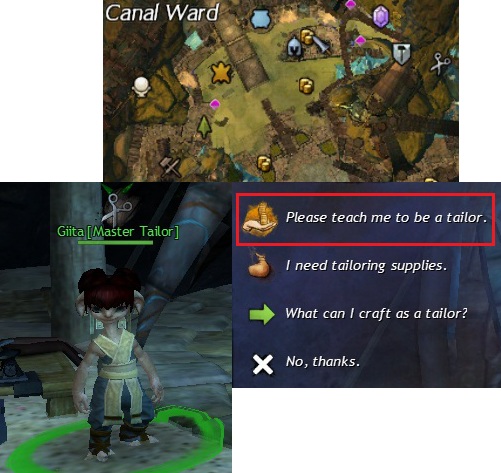
You have four options: Discovery of new recipes, Production, bank and Collections. Production is simple: check how many resources you need, take them from the collection and then choose the craft. If you want to make more than one item at once, set the number before production. If you have use all resources choose the craft all.
To product an item you have to make few things:
Choose the Production bookmark

Then the refinement
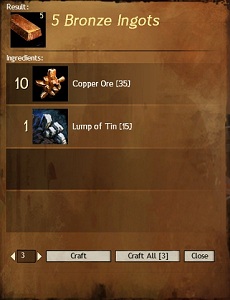
you make self-products like blades, hilts (crafting components)
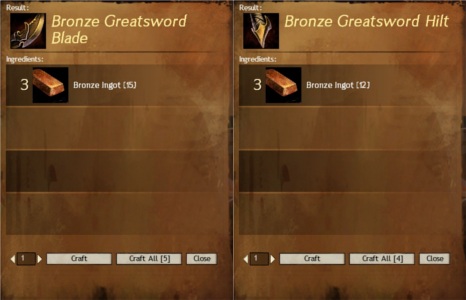
craft the final item
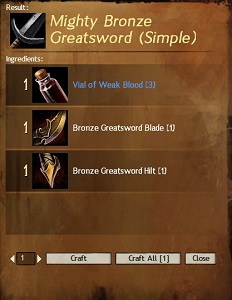
The method above let you craft known items, but it has one big disadvantage: it gives small amount of XP. Here, you should look at the levels of crafted items, professions and required character's level to use the item:
Item/material level | Profession level | Required character's level |
1 | 0 - 74 | 5 - 20 |
2 | 75 - 149 | 25 - 35 |
3 | 150 - 224 | 40 - 50 |
4 | 225 - 299 | 55 - 65 |
5 | 300 - 399 | 70 - 80 |
6 | 400 | 80 |
As you can notice, to use the higher levels of resources you have to gain experience in your profession: the more you get them, the more powerful items you'll be able to craft. To do so, you can craft known items or use a shortcut: every 25 points on the level may be gained by performing the untreated resources. Mass making ingots from ores will level up you very quickly.
Unfortunately, after treating all basic resources the speed of gaining XP goes down. To increase it, use discovery. This is very similar to crafting: you make proper resources and change them into semi-finished item. But in this case, you need get one additional ingredient, which is an insignia. After collecting all components open the discovery bookmark. All elements which can be used to find new recipes will be displayed. Choose components until you'll get informed that you've crafted a new item.
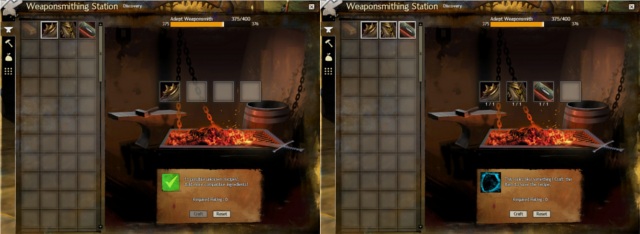
During discovering a new item. Non-usable components will be unavailable..
After choosing craft, the new recipe will be added to your list, you receive a new item and XP with the bonus for discovery. This method is a basic way to increase your profession XP after first twenty five points.
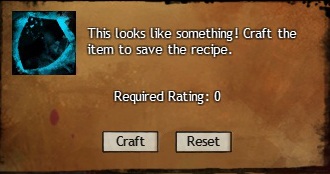
It's worth mentioning, that some recipes are shared by few professions: for example iron ingots may be produced by both, armorsmith and weaponsmith. Unfortunately, to use the previously discovered recipe you have to get a required level of the particular profession. On the other hands, it has a good side: you can use the recipe again, for additional XP.
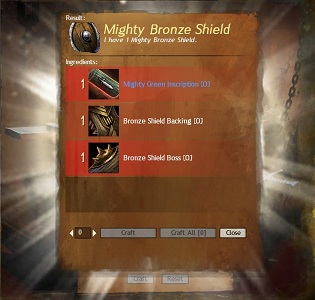
Summing it up, crafting consists in:
- gaining materials (gathering them with tools or from defeated enemies)
- processing materials into recycling materials (ingots, boards)
- creating the half products (insignies also, if you want to discover new items)
- crafting the final product
Final product can be given to your friends, sold to other players (via trading post) or used to regain resources from it (via salvage kit). In all professions it looks identical.
- Guild Wars 2 Game Guide
- Guild Wars 2: Game Guide
- Guild Wars 2: Crafting
- Guild Wars 2: An introduction to crafting
- Guild Wars 2: Materials - resources
- Guild Wars 2: Materials - plants
- Guild Wars 2: Materials - salvaging the materials
- Guild Wars 2: Battle loot
- Guild Wars 2: Managing of the materials
- Guild Wars 2: Production, experience
- Guild Wars 2: Professions
- Guild Wars 2: Mystic Forge
- Guild Wars 2: Legendary weapon
- Guild Wars 2: Exotic precursor weapon
- Guild Wars 2: Crafting
- Guild Wars 2: Game Guide
You are not permitted to copy any image, text or info from this page. This site is not associated with and/or endorsed by the developers and the publishers. All logos and images are copyrighted by their respective owners.
Copyright © 2000 - 2025 Webedia Polska SA for gamepressure.com, unofficial game guides, walkthroughs, secrets, game tips, maps & strategies for top games.
